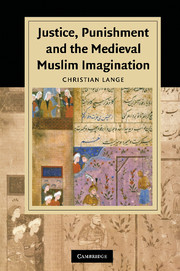Introduction
Published online by Cambridge University Press: 21 July 2009
Summary
This book is a study of the theory and the practice of punishment in the later Islamic Middle Period, in particular under the Saljūq rulers of Iraq and Persia (fifth/eleventh and sixth/twelfth centuries). Punishment is defined here as the premeditated use of legitimate force against members of the Muslim polity. The goal of this endeavor is to throw light on a number of issues: how was the use of violence against Muslims explained and justified under the conditions of a militarized régime such as that of the Saljūqs? How were the interests of individuals to preserve the integrity of their bodies defined vis-à-vis the governing classes' claim to power? Phrased differently, what role did punishment play in delineating the private from the public sphere? Finally, what cognitive strategies did people, both intellectuals and commoners, devise and deploy in order to cope with the suffering caused by punishment? From a religious perspective, for example, how did they conceive of the relationship between punishment in this world and the next? Such questions not only bring to the fore some fundamental principles of social organization; they also address deeply embedded categories of thought, since a society's system of punishment and reward is a prime indicator of how it defines the limits of justice. Thus, this study hopes to contribute to our understanding of the very fabric of medieval Islamic life.
A study of punishment with specific regard to the Saljūqs is promising for several reasons.
- Type
- Chapter
- Information
- Publisher: Cambridge University PressPrint publication year: 2008



